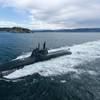The USCG currently admits its Regional Examination Centers (RECs) are broken and don't provide the service needed to the maritime public. The USCG believes drastic measures are needed to change the system enough so they can repair it and make it more workable. Unfortunately, the drastic modifications proposed do not seem to address what are perceived as problems by maritime users of the RECs.
While many in the USCG indicate no final decisions have been made, it certainly appears the USCG fully intends to privatize the license/Merchant Mariner's Document (MMD) examinations as a first step toward closing all RECs and centralizing all administrative processing at one location nationwide. The intent is to free up the resources currently committed to the REC program to fund initiatives bringing the U.S. into compliance with the STCW, 1995 amendments.
The USCG points to the supposed success of centralizing the vessel documentation system in the National Vessel Documentation Center in West Virginia. Many in the industry do not see this as a glowing example demonstrating improved service to the public.
A Public Notice in the Federal Register in September 1998 and ultimate public meeting in New Orleans in October 1998, coupled with all manner of rumors, have unnerved many licensed and certified maritime personnel and operating maritime companies utilizing maritime professionals. The USCG licensing/certification process has virtual life and death control on their professional careers. No mariner can advance without obtaining MMDs and upgrading their endorsements and licenses.
There are four elements of the licensing and certification system with which mariners are concerned. They include development of individual license questions and examinations, evaluation of applicants' experience to qualify to sit for an examination, administration of the examinations and issuing the final documentation following the examination.
Mariners generally believe the license examinations are faulty - the evaluations of experience are unfair and at best inconsistent from one evaluator to another; and the personnel mariners deal with seem to have no understanding of their absolute power over the individual mariner's future. Mariners generally believe the one portion of the system not broken is the method of applying examinations.
It is most unfortunate the USCG apparently wants to privatize the one working element in the licensing system: The examination itself. It is the other three parts of the system most individuals currently deal with the RECs want repaired.
Up through the early 1960s, most USCG marine inspection duties (including licensing) were performed by personnel originally from the maritime industry. They were either from the USCG's predecessor organization, the Bureau of Marine Inspection and Navigation (BMIN), or directly commissioned from the maritime under the 219 program (named after the public law requiring one half of marine inspection personnel be from the maritime).
It was one of the few ways a mariner could get a job allowing him to remain active in the maritime trade and sleep at home at night. Some of the other shore-side jobs included port captains, port engineers, classification societies and various repair organizations. In general, mariners worked until they were no longer healthy enough to work, there being no retirement or pension programs. Many died on the job. Only the best mariners got into government service, classification societies and operating companies ashore.
Most personnel involved in marine inspection held maritime licenses. With respect to inspection and licensing activities, the inspectors knew ships, were very tough minded and wanted everything their way, remembering at one time in their careers, they had been operators of commercial vessels. Many held top licenses as either Master or Chief Engineer.
All examinations were written in essay format, no multiple choice. Licensing officers were charged to give fair license examinations. With all questions in essay format, a good deal of professional knowledge was needed just to properly grade an exam.
In the late 1950s the USCG started to convert to multiple choice examinations. The process was not complete until the mid-1970s. There were many effects of converting the examinations to multiple choice, not the least of which was that it tended to eliminate the need for local expertise concerning license examination questions and instead, centralized it at the Washington level (or wherever the examinations were prepared - later Oklahoma City).
The USCG no longer felt any obligation to staff licensing examination billets with professional mariners. From that time on there have been very few if any seasoned professional mariners involved with the generation of license examinations and the evaluation of a mariner's experience for a license. In general terms, commissioning mariners who are currently sailing is not workable. This source of personnel has dried up with the implementation of pension programs for sea-going maritime personnel. Bringing sufficient numbers of new graduates into the USCG from the various maritime academies would take many years to impact the system.
Today, the USCG apparently feels slight obligation to licensed mariners. They see themselves as enforcers of the STCW rather than guardians of the maritime professional qualifications.
The 1995 amendments to the International Maritime Organization's (IMO), Standards of Training Certificating and Watchstanding (STCW) require the USCG alter the way they do business by adding more oversight and enforcement to the approved training programs called a Quality Standards System (QSS) and increased Port State Control boardings. The U.S. delegation (USCG) at IMO actively supported these amendments to STCW.
The USCG are clearly the experts on the contents of the STCW. They negotiated it at IMO and enforce it upon the U.S. flag anywhere and all countries in the domestic U.S. The STCW is very important to the USCG.
USCG management has apparently determined it is more important to alter the licensing and certification system in order to pay for changes required by the 1995 STCW amendments. They apparently believe the current system needs drastic modification but are not sure how best to modify it. They perceive they have a duty to protect the general public from maritime operations and under-qualified mariners, with no room for concern for the mariner's interests in any of this.
The USCG seems to be unable to meaningfully develop remedies for problems they acknowledge exist. It is questionable that more than a very few insightful individuals within their ranks understand the mariners' concerns. The one thing that cannot be done is turn back the clock and restore the system to what it was 50 years ago. The USCG has the authority to change the system the way they believe is right and mariners seem to have little or no say in the matter.
One ongoing positive development concerns specific USCG approved courses of instruction which are designed and approved to generate a licensed individual without a formal USCG examination. These USCG course approvals are for specific licenses and circumstances and are held by specific operating companies and training schools. USCG oversight can ensure that abuses don't occur. These approved courses have already become a critical source of highly trained and qualified personnel. There is no question the USCG's use of these approved courses as an alternative to examinations is a positive and necessary step forward, but this program must be expanded only in a careful and deliberate manner.
One must wonder, if the military and civilian members of the USCG had to work through the current or envisioned licensing system for promotion or maintenance of their right to employment. What would it be like?
Charley Havnen is a Commander USCG Ret. His organization can help with vessel construction projects, regulatory problems, vessel manning issues, procedure manuals, accident analysis or expert witness. He can be reached by contacting the Havnen Group at 800-494-3883 or 504-394-8933.
Sponsored Content
Chris-Marine’s solutions help to prolong engine lifetime

Subscribe for
Maritime Reporter E-News
Maritime Reporter E-News is the maritime industry's largest circulation and most authoritative ENews Service, delivered to your Email five times per week










